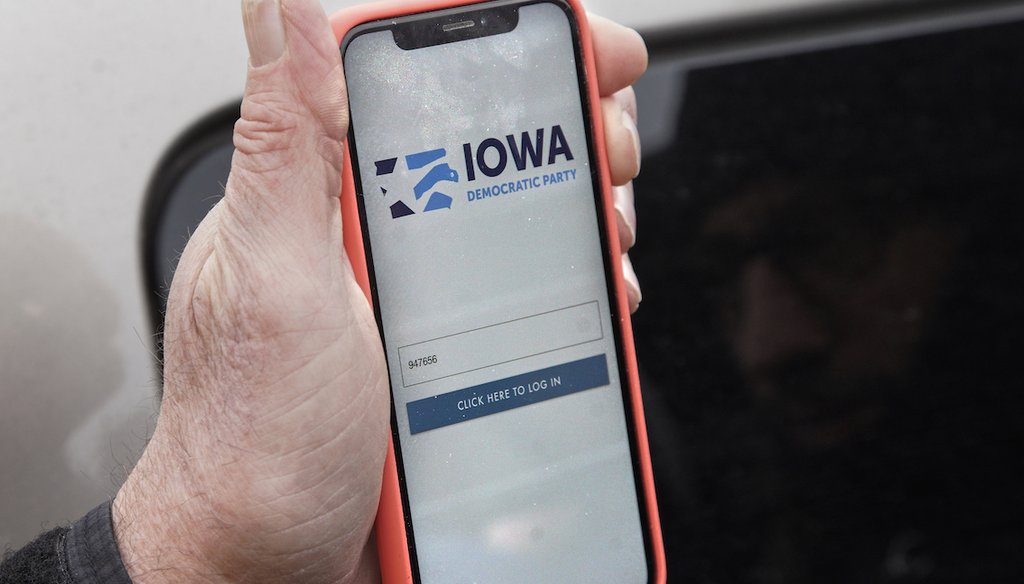Get PolitiFact in your inbox.

Precinct captain Carl Voss of Des Moines displays the Iowa Democratic Party caucus reporting app on his phone outside of the Iowa Democratic Party headquarters in Des Moines, Iowa, Tuesday, Feb. 4, 2020. (AP Photo/Nati Harnik)
If Your Time is short
-
Buttigieg’s campaign paid Shadow $42,500 for "software rights and subscriptions." They had no role in the app used by the Iowa Democratic Party.
-
The presidential campaigns for former Vice President Joe Biden and U.S. Sen. Kirsten Gillibrand, who has since dropped out of the race, also reported paying Shadow for services in 2019.
As Iowa Democratic Party officials blamed an app for the delayed release of caucus results, conspiracies started swirling about something more corrupt.
"The app that ‘failed’ in Iowa last night was developed by a software company called Shadow," one such tweet said. "Shadow was paid by Pete Buttigieg campaign last summer. Pete Buttigieg has now claimed victory before any precincts have reported. What’s that about election interference?"
Here’s what we know.
What happened in Iowa?
The Iowa Democratic Party failed to announce the winner of the state’s Feb. 3 Democratic caucus thanks to what it called a "coding issue" in an app it planned to use to tabulate results, the New York Times reported. People who were briefed on the app by the state party said that it wasn’t properly tested on a statewide scale, according to the paper, and reported only partial data.
"As part of our investigation, we determined with certainty that the underlying data collected via the app was sound," said Iowa Democratic Party Chair Troy Price. "While the app was recording data accurately, it was reporting out only partial data. We have determined that this was due to a coding issue in the reporting system. This issue was identified and fixed. The application’s reporting issue did not impact the ability of precinct chairs to report data accurately."
Price also said the party has "every indication that our systems were secure and there was not a cybersecurity intrusion."
Multiple county chairs said they struggled to use the app and were put on hold for up to an hour when they called a phone hotline the party has used for decades, according to the Times.
The paper quoted another person who spoke on the condition of anonymity because he had agreed not to discuss the app as saying there were concerns it would malfunction in areas with poor connectivity or when too many people tried to use it at the same time.
What is Shadow?
The app used by the state party was built by a for-profit technology company called Shadow, Inc.
According to its website, Shadow’s mission is to "build political power for the progressive movement by developing affordable and easy-to-use tools." One of them, called Lightrail, is described as "a data integration and automation tool" to help organize data.
"Get voter, volunteer and donor data where it needs to go with just a few clicks," the site says. "Pull a list of people who RSVPed yes to a MobilizeAmerica event and easily send to a texting tool for confirms."
Shadow also offers a messaging service that campaigns can use to recruit volunteers and "mobilize voters."
Who owns Shadow?
The Shadow "team" is made up of "campaign and technology veterans who have built and implemented technology" at Google, Apple and the Democratic National Committee, and working on campaigns for Hillary Clinton and Barack Obama, according to Shadow’s website.
Shadow started as Groundbase, according to the Los Angeles Times, a tech developer co-founded by Gerard Niemira and Krista Davis, who worked for the tech team on Hillary Clinton’s 2016 presidential campaign.
In January 2019, Acronym acquired Groundbase to function as its tech-development arm, the newspaper said.
What is Acronym?
Acronym is a Democratic nonprofit that aims to advance progressive causes. You can access Shadow’s website from Acronym’s by clicking on a link about "equipping progressive campaigns with the organizing + data tools to win."
After acquiring Groundbase in 2019, Acronym tweeted: "We’ve acquired SMS tool Groundbase & are launching Shadow, a company focused on building the technology infrastructure needed to enable Democrats to run better, more efficient campaigns."
Reporting on the acquisition at the time, Politico said that Acronym would "launch Shadow, a tech company that will operate Groundbase and build other products."
But, amid the Iowa caucus meltdown, Acronym seems to be distancing itself from Shadow. The New York Times reported that Acronym said in a statement that it was a separate entity from Shadow and that it was still waiting to hear about what happened.
TechCrunch reported that language on Acronym’s "About" page changed from saying that in January 2019, it "launched Shadow, a tech company focused on enabling organizers to run smarter campaigns" to its current language, saying that the nonprofit "invested in Shadow."
Acronym’s founder and CEO,Tara McGowan, who worked on Obama’s 2012 presidential campaign, tweeted on Feb. 4 that Shadow is "an independent company Acronym invested in."
"We don’t have any information beyond the public statements the IDP has put out + like all of you, eagerly await learning what happened and who won the IA caucus," McGowan said.
What do we know about Shadow’s funding?
The Iowa Democratic Party paid about $60,000 to Shadow, according to the Los Angeles Times. Federal Election Commission disclosures show other state Democratic parties also paid Shadow for services in 2019.
In November, the Democratic Party of Wisconsin paid Shadow $3,750 for "subscription fee - text messages," according to filings. The Texas Democratic Party paid $125 for a "texting platform" and another $125 for "online productivity tools." The Nevada State Democratic Party, which will hold the next presidential caucuses, paid $58,000 for "technology services."
But CNN reported on Feb. 4 that the Nevada party said it won’t use Shadow during its caucuses on Feb. 22.
How is Pete Buttigieg involved?
Even though caucus results were delayed, Democratic presidential candidate Pete Buttigieg was triumphant, tweeting early in the morning on Feb. 4 that he was heading "to New Hampshire victorious." Later that day, during an interview with MSNBC, he seemed to temper that announcement, saying that the campaign was reviewing internal numbers and began to realize "something extraordinary had happened."
"Here you have a campaign that was really questioned when we got in for whether we even oughta be here, whether we belonged in this race, and to not only establish that, but to reach the position that we did was a clear victory for our campaign," he said.
On social media, some users started to speculate that what they interpreted as a victory announcement was a sign of corruption. Conspiracy theories began to spread that the election had been rigged in Buttigieg’s favor because of his connection to Shadow.
Some claims, such as that the Iowa caucus app was funded by Buttigieg, mischaracterize what we know.
Buttigieg’s campaign, Pete for America, Inc., paid Shadow $42,500 for "software rights and subscriptions."
Sean Savett, a spokesman for the campaign, told PolitiFact that they contracted with Shadow for text messaging services to help them contact voters.
It was "totally unrelated" to the app Shadow built for the caucuses, he said; Buttigieg’s campaign wasn’t involved in the app’s development.
Does Shadow have ties to other campaigns?
The presidential campaigns for former Vice President Joe Biden and U.S. Sen. Kirsten Gillibrand, who has since dropped out of the race, also reported paying Shadow for services in 2019.
The New York Times reported that the Iowa Democratic Party was secretive about using the app, and that it asked that Shadow’s name be withheld from the public. "According to a person familiar with the app, its creators had repeatedly questioned the need to keep it secret, especially from the Iowa precincts where it would be used."
On its website, Acronym’s claims it "helped elect 65 progressive candidates across the country with new tech and digital-first strategies to register and turn out voters."
Its founder, McGowan, has voiced support for Buttigieg, tweeting "Mayor Pete is running" with heart-eye emojis in January 2019.
Our Sources
Tweet, Feb. 4, 2020
Tweet, Feb. 4, 2020
Tweet, Feb. 4, 2020
New York Times, Delays mar Iowa caucuses as Democrats start nominating process, Feb. 3, 2020
New York Times, Iowa Democratic Party says ‘coding issue’ delayed results, Feb. 4, 2020
New York Times, App used to tabulate votes is said to have been inadequately tested, Feb. 3, 2020
Business Insider, Pete Buttigieg is backtracking his victory speech from Iowa, noting that he doesn’t have any official numbers but that it’s ‘extraordinary’ that his campaign made it this far, Feb. 4, 2020
TechCrunch, A voting app by Shadow Inc. takes center stage at the chaotic Iowa caucuses, Feb. 4, 2020
Los Angeles Times, Tech firm started by Clinton campaign veterans is linked to Iowa caucus debacle, Feb. 4, 2020
CNN, Nevada Democratic Party abandons problematic app used in Iowa caucuses, Feb. 4, 2020
Acronym about page, visited Feb. 4, 2020
Shadow website, visited Feb. 4, 2020
Politico, Morning score, Jan. 17, 2019
Federal Election Commission, Disbursements to Shadow in 2019-2020
Lee Fang tweet, Feb. 3, 2020
Pete Buttigieg tweet, Feb. 4, 2020
Acronym tweet, Jan. 17, 2019
Tara McGowan tweet, Feb. 4, 2020
Tara McGowan tweet, Jan. 23, 2019
Email interview with Sean Savett, rapid response communications director, Pete Buttigieg campaign, Feb. 4, 2020
























